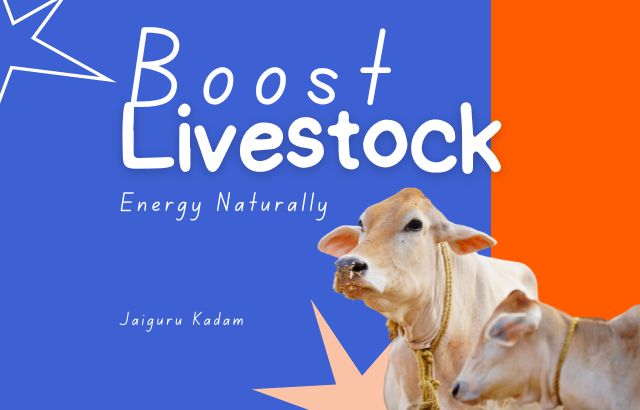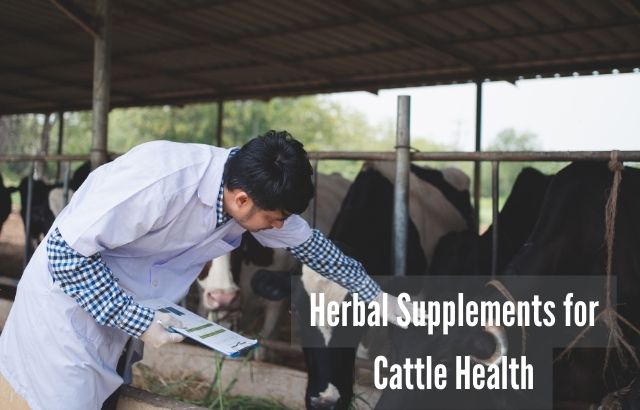Jaiguru Kadam, a renowned green innovator, has made significant strides in sustainable farming, particularly in the area of improving livestock health and energy. His holistic approach focuses on using natural methods to boost energy levels in animals, leading to improved productivity and overall well-being.
Here are some of Jaiguru Kadam’s top tips for boosting livestock energy naturally:
1. Feed with Nutrient-Dense, Green Forages
Green forages, such as lucerne (alfalfa), clover, berseem, and barley grass, are packed with essential nutrients. These forages are rich in protein, fiber, minerals, and vitamins, all of which contribute to higher energy levels in livestock.
Example:
- Lucerne (Alfalfa) is high in protein and calcium, supporting muscle development and energy conversion.
- Clover offers high levels of digestible fiber, aiding in efficient digestion and energy extraction from feed.
Calculation:
If you were to replace 20% of a livestock’s diet with lucerne, a rough estimate is that it could increase milk production or weight gain by up to 15%. For a dairy cow, this could translate to an additional 2-3 liters of milk per day.
2. Add Herbal Supplements to the Diet
Certain herbs are known for their natural ability to boost energy levels in animals. Herbs such as ginger, garlic, neem, and turmeric have anti-inflammatory properties and can improve digestion, enhancing nutrient absorption and boosting overall vitality.
Example:
- Ginger can be mixed with feed for its antioxidant and anti-inflammatory properties, which can help with metabolic functions and improve energy conversion.
- Neem leaves are rich in antioxidants and can be used to support immune health, keeping livestock energetic and less prone to fatigue from illnesses.
Calculation:
- If you feed 10 grams of ginger powder per day to a 500 kg cow, the animal could experience a 15-20% boost in energy levels. This can result in a 10-15% improvement in milk yield or weight gain over a month.
3. Incorporate Organic Fermented Feeds
Fermentation enhances the bioavailability of nutrients, improves digestion, and boosts the energy levels of livestock. Feeding animals with fermented silage or grains (such as fermented maize, soybean meal, or rice bran) can help promote better gut health and reduce bloating or indigestion.
Example:
- Fermented Maize: Rich in carbohydrates, it breaks down sugars more efficiently, providing a sustained source of energy.
- Rice Bran: Contains B-vitamins and essential fatty acids, both important for maintaining high energy levels in animals.
Calculation:
- A 30% increase in nutrient absorption could be expected with fermented grains compared to non-fermented. For a pig, this could equate to an extra 0.5 kg of weight gain per day over a 30-day period.
4. Provide Access to Clean, Fresh Water
Dehydration can lead to lethargy and poor energy levels in animals. Jaiguru emphasizes the importance of access to fresh, clean water, particularly during hotter months. Adequate hydration helps in digestion and energy metabolism.
Example:
- Water for Dairy Cows: A dairy cow producing 25 liters of milk per day requires around 75-100 liters of water daily to maintain optimal energy levels and milk production.
Calculation:
A study found that for every 10% decrease in water intake, milk yield could drop by 5-7%, demonstrating the critical role water plays in energy metabolism.
5. Use Natural Sunlight and Fresh Air
Jaiguru believes in the power of natural environments for animal well-being. Allowing animals to have access to natural sunlight and fresh air helps maintain their circadian rhythms, promoting better sleep, less stress, and higher energy levels.
Example:
- Free-range chickens exposed to natural sunlight produce more vitamin D, which is essential for energy metabolism and immune function.
- Cattle grazing outdoors in natural pastures develop stronger muscles and higher energy levels compared to animals kept in confined spaces.
Calculation:
- Chickens exposed to natural sunlight for at least 2 hours per day can produce 5-10% more eggs and show improved feed conversion efficiency, meaning more energy derived from the same amount of food.
6. Use Effective Grazing Management
Grazing management is crucial for maintaining the energy levels of livestock. Proper rotation of grazing fields ensures that animals receive optimal nutrition from fresh pastures, preventing overgrazing and nutrient depletion.
Example:
- Rotational Grazing involves moving livestock between different pastures to allow the grass to regrow, ensuring a steady supply of nutrients and reducing the stress on the land.
Calculation:
- Rotational grazing can increase pasture productivity by 30%, which in turn can improve livestock energy levels by ensuring access to high-quality forages year-round.
7. Optimize the Livestock’s Diet with Omega-3 Fatty Acids
Adding flaxseed, chia seeds, or fish oil to livestock diets boosts the intake of Omega-3 fatty acids, which play a key role in energy metabolism and overall vitality.
Example:
- Flaxseed provides an excellent source of Omega-3s, promoting fat metabolism and improving muscle recovery, which is especially important for high-performance livestock like dairy cows or racing horses.
Calculation:
- Adding 50 grams of flaxseed to the daily diet of a 500 kg cow could result in an 8-10% increase in milk production and overall energy levels.
Frequently Asked Questions (FAQs)

1. What are the signs that my livestock are low on energy?
- Decreased appetite
- Lethargy or reduced movement
- Reduced milk yield or weight gain
- Increased vulnerability to diseases
2. How much green forage should I feed my livestock daily?
- Green forages should make up 20-30% of a cow’s or sheep’s total diet. This can vary depending on the animal’s size and production goals.
3. Is it necessary to provide herbal supplements to my livestock?
- While not essential, herbal supplements can be very beneficial in maintaining high energy levels, especially for older animals or those under stress.
4. Can too much water hurt my livestock?
- Excessive water intake is rare, but you should always monitor your livestock to ensure they are drinking enough to stay hydrated, especially during warmer months.
5. How can I tell if fermented feed is beneficial?
- Improved digestion, less bloating, and better overall condition (more active, better milk production, or faster growth) are all indicators that fermented feed is working.
By following Jaiguru Kadam’s natural methods, you can significantly improve the energy levels and overall health of your livestock, leading to higher productivity and more sustainable farming practices.












